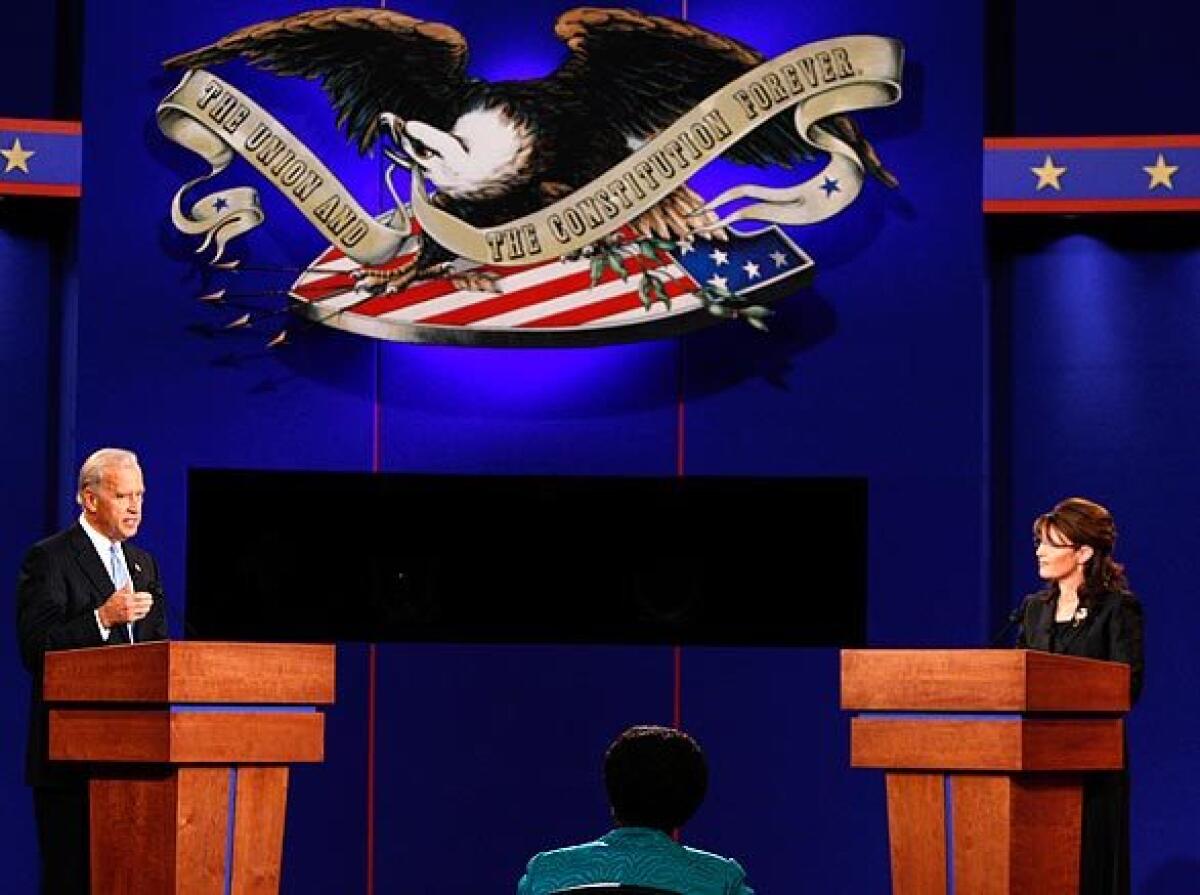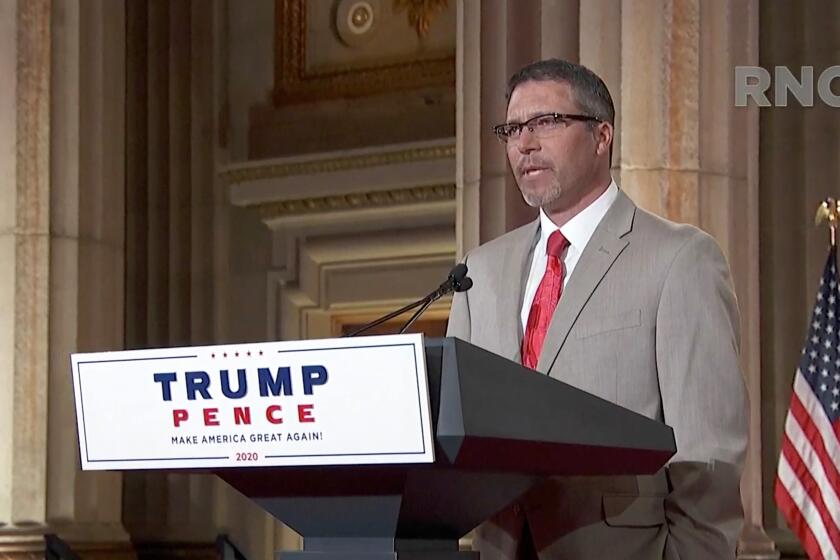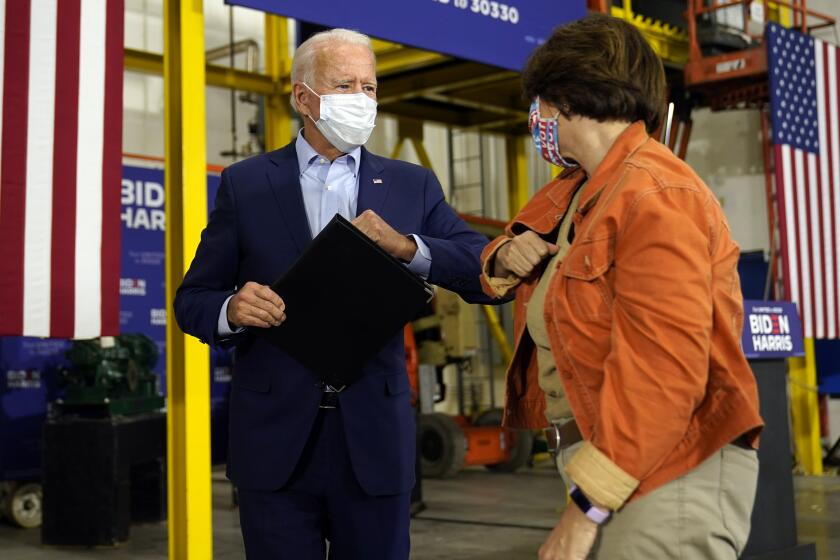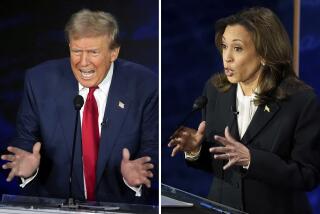Biden is prepping for first debate. Trump is watching TV news and testing attack lines

WASHINGTON — President Trump publicly insists he doesn’t rehearse for debates, claiming recently that he is preparing for his first debate on Tuesday in Cleveland with Democratic nominee Joe Biden “just by doing what I’m doing.”
But behind the scenes, Trump is quietly studying videotapes of Biden’s debate performances in 2008 and 2012 to look for weakness or vulnerabilities he can exploit. He is batting around attack lines with aides, and not holding a more formal mock debate or sessions devoted to memorizing facts and data points.
For his part, Biden is huddling with a small group of advisors in Wilmington, Del. The former vice president plans to attack Trump’s leadership as unsteady, challenge the president’s repeated falsehoods, and contrast his own experience in a crisis.
In a year upended by a deadly pandemic, a severe recession, a climate crisis in the West and social unrest, the death of Supreme Court Justice Ruth Bader Ginsburg and the brewing battle to fill her seat has thrust two more pivotal issues — healthcare and abortion — to the fore a week before the two candidates go toe to toe for the first of three televised debates.
The Sept. 29 face-off will be moderated by Fox News anchor Chris Wallace and will feature 15-minute segments on six topics: the Supreme Court, COVID-19, the economy, race and policing, election integrity and both candidates’ records.
Trump’s team sees the 90-minute debate as a make-or-break opportunity to save his reelection campaign, which is down in the polls and lagging in cash as early voting begins in several states.
Two states give electoral votes by congressional district, not winner-take-all statewide. That brings Biden’s campaign to Omaha, Trump’s to Maine.
Trump’s aides believe his near-daily bantering with White House reporters put him on a stronger footing to react in a live, unscripted setting than Biden, who takes questions from reporters as he travels but hasn’t held a full news conference in months.
Biden’s camp has downplayed the significance of the debates, noting that his lead in national polls, now about 6.5 percentage points, has changed little since the pandemic erupted last spring.
Polls show widespread dissatisfaction with Trump’s handling of the crisis, which has killed more than 200,000 Americans. Democrats believe the deadly virus will continue to overshadow all other issues in the debates and the race.
“More than any time in my lifetime, I think that a clever line or a cute comeback in the debate is not going to be as important as the next day, when you have to do video school with your kid or you have to find a job,” said Robert Barnett, who has helped Democratic candidates rehearse for debates in every election since 1976, though he’s not working with Biden’s team this year.
“Reality will intrude in a way it never has before,” he added.
The president has set expectations particularly low for his opponent. He regularly tells his supporters that Biden, who is 77, “doesn’t know he’s alive,” and suggests he is senile and “dead as a rock.”
After Biden gave an energetic speech, the president — who is 74 — suggested without evidence that he took performance-enhancing drugs.
Biden’s advisors see those taunts as an advantage — pointing to Biden’s even-keeled performances in primary debates and other high-profile appearances.
President Trump and Joe Biden both campaigned in Minnesota on Friday, a longtime Democratic bastion that’s now a battleground state.
They compare that to Trump’s bizarre suggestion at a White House briefing in May that injecting disinfectant could kill the coronavirus, a notion so dangerous that the makers of Clorox and Lysol publicly pleaded with Americans not to inject or ingest their products.
The former vice president has flummoxed Trump’s advisors because, despite a propensity for stumbles, his demeanor and more common vernacular often wear well with viewers.
“It’s sort of baked in the cake. He’s Uncle Joe. He’s not the smoothest talker in politics. That’s why people like him,” said Lis Smith, a Democrat who advised Pete Buttigieg, one of Biden’s most eloquent opponents in the primaries last spring.
The president famously does not read briefing books and struggles to absorb information from oral briefers. So his preparation sessions are somewhat informal, with close aides going through potential attack lines and talking points, officials say.
“The president is constantly prepping,” said Mark Meadows, the White House chief of staff. “We obviously will be well prepared for the debates. We’re not taking it for granted.”
Trump recently watched Biden’s 2008 and 2012 vice presidential debates, and he consumes a heavy daily diet of TV news, keeping tabs on Biden’s performances in speeches and town halls, according to two people familiar with the president’s debate prep.
As with most of his appearances, Trump plans to rely heavily on his instincts and simply react. His unpredictability, indifference to norms of decorum, and disregard for the truth make him a special challenge in a live debate.
Biden plans to push back against at least some of Trump’s “most egregious lies,” but aides are wary of getting too deep into fact-checking the president, said a person familiar with his debate prep.
“If you let it go and you just try to stick to your points on healthcare and everything else, you’re basically validating” Trump’s false statements, said Jay Carney, a Biden supporter who was White House press secretary when Biden was vice president.
But “if an opponent has to be the one that’s calling President Trump on a misstatement or a falsehood, then it becomes a he-said, he-said,” Carney added.
More Campaign 2020 coverage
Tim Miller, an anti-Trump Republican who worked on former Florida Gov. Jeb Bush’s unsuccessful presidential campaign in 2016, agrees that Trump often leaves his opponents without an easy option.
“Some people will say that you don’t want to wrestle with a pig because you don’t want to get muddy. And there’s some truth to that,” he said. “But at the same time, you can’t just let [the president] get away with things.”
Bush and other Republican candidates who got into name-calling spats with Trump in the 2016 primaries suffered.
Trump tried another tactic, intimidation, with his Democratic opponent, Hillary Clinton, that fall. At one point, he wandered the stage behind her as she spoke in an apparent attempt to unnerve her. He repeatedly interrupted her and made false boasts and accusations.
She was widely seen as having won all three debates, but it did not carry her to victory, partly because she failed to make a strong, affirmative case for herself, Smith said.
“It’s important for Joe Biden not to fall into that trap,” Smith said.
She predicted Trump would try to rattle Biden and distract the media with a stunt, as he did just before one of his debates with Clinton in 2016. He held a news conference with four women who had accused her husband, former President Clinton, of sexual misconduct and gave them seats in the hall.
“The biggest thing that Biden needs to do is to not get sucked into Trump’s crazy,” Smith said.
Incumbent presidents are often rusty at their first debate. Trump may be different in that respect too, having spent much of his presidency verbally sparring with reporters.
Still, there is potential for overconfidence. President Obama flopped in his first 2012 debate with Mitt Romney, the Republican nominee. Obama’s aides and his wife convinced him to spend more time preparing for the next two debates, where he performed better.
Barnett says most candidates do full rehearsals as the last step in debate prep. By then, advisors have spent hours refining potential attack lines and defense strategies.
Few candidates enjoy watching themselves on playback as advisors critique their responses, a step that can help motivate those who have fallen out of practice. Trump has insisted he does not do that type of preparation, but Barnett is dubious.
“He knows that he is in for the fight of his life and the fate of his possible second term,” Barnett said. “Given that, it is inconceivable to me he is taking this lightly.”
More to Read
Get the L.A. Times Politics newsletter
Deeply reported insights into legislation, politics and policy from Sacramento, Washington and beyond. In your inbox three times per week.
You may occasionally receive promotional content from the Los Angeles Times.















